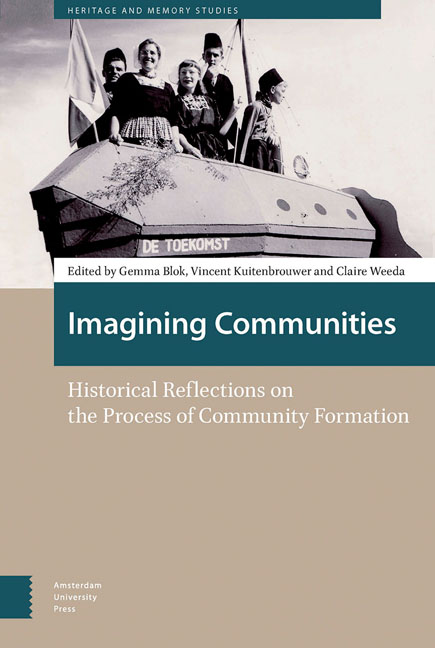Book contents
- Frontmatter
- Contents
- List of Figures
- Introduction
- 1 Meanwhile in Messianic Time: Imagining the Medieval Nation in Time and Space and English Drinking Rituals
- 2 Diverse Origins and Shared Circumstances: European Settler Identity Formation in the Seventeenth-Century Plantation Colony of Suriname
- 3 Imagining Europe: The Peace of Ryswick (1697) and the Rise of European Consciousness
- 4 Gypsy Music and the Fashioning of the National Community
- 5 ‘Tired, Worried and Overworked’: An International Imagined Community of Nervous Sufferers in Medical Advertisements, 1900-1920
- 6 ‘From Heart to Heart’: Colonial Radio and the Dutch Imagined Community in the 1920s
- 7 Indonesian Nationalism in the Netherlands, 1920s-1930s: Long-Distance Internationalism of Elite Pilgrims in Homogeneous, Empty Time
- 8 Time, Rhythm and Ritual: Imagined Communities in L’espoir (1937) and Les sept couleurs (1939)
- 9 Stamverwantschap and the Imagination of a White, Transnational Community: The 1952 Celebrations of the Jan van Riebeeck Tercentenary in the Netherlands and South Africa
- 10 ‘L’Oranie Cycliste, une grande famille’: Recycling Identities and the Pieds-Noirs Communitas, 1976-2016
- 11 Remembering and Imagining the National Past: Public Service Television Drama and the Construction of a Flemish Nation, 1953-1989
- Index
9 - Stamverwantschap and the Imagination of a White, Transnational Community: The 1952 Celebrations of the Jan van Riebeeck Tercentenary in the Netherlands and South Africa
Published online by Cambridge University Press: 11 December 2020
- Frontmatter
- Contents
- List of Figures
- Introduction
- 1 Meanwhile in Messianic Time: Imagining the Medieval Nation in Time and Space and English Drinking Rituals
- 2 Diverse Origins and Shared Circumstances: European Settler Identity Formation in the Seventeenth-Century Plantation Colony of Suriname
- 3 Imagining Europe: The Peace of Ryswick (1697) and the Rise of European Consciousness
- 4 Gypsy Music and the Fashioning of the National Community
- 5 ‘Tired, Worried and Overworked’: An International Imagined Community of Nervous Sufferers in Medical Advertisements, 1900-1920
- 6 ‘From Heart to Heart’: Colonial Radio and the Dutch Imagined Community in the 1920s
- 7 Indonesian Nationalism in the Netherlands, 1920s-1930s: Long-Distance Internationalism of Elite Pilgrims in Homogeneous, Empty Time
- 8 Time, Rhythm and Ritual: Imagined Communities in L’espoir (1937) and Les sept couleurs (1939)
- 9 Stamverwantschap and the Imagination of a White, Transnational Community: The 1952 Celebrations of the Jan van Riebeeck Tercentenary in the Netherlands and South Africa
- 10 ‘L’Oranie Cycliste, une grande famille’: Recycling Identities and the Pieds-Noirs Communitas, 1976-2016
- 11 Remembering and Imagining the National Past: Public Service Television Drama and the Construction of a Flemish Nation, 1953-1989
- Index
Summary
Abstract
This case study focuses on the 1952 celebration of the 300th anniversary of the landing of the Dutchman Jan van Riebeeck in the Cape. It shows how several families who had emigrated from the Netherlands to the town of Upington in the Western Cape presented themselves as Dutch South Africans who felt connected to the white population of South Africa. Photos and memories of their contribution to the local festivities will be contextualized in a broader frame of national celebrations (and the protests against it) of the Van Riebeeck Tercentenary in both South Africa and the Netherlands. This chapter explores the meaning of Van Riebeeck as a historical persona around whom the image of South Africa as a ‘white man's nation’ was constructed, and how that image was taken up in the Netherlands. Additionally, this chapter examines how Dutch migrants in South Africa used the local Van Riebeeck celebrations to simultaneously perform and display their shared Dutchness – through their white skins in Dutch costumes and the design of their common floats – within the local community and their transnational belonging to both the Netherlands and South Africa. The concept of ‘imagined communities’ provides a basis to analyse the in- and exclusion of groups of people from the modern nation state of South Africa, and to expand the concept to the imagining of transnational communities – in this specific case the so-called ‘stamverwantschap’ (kinship ties) connecting Dutchness and the Netherlands with white Afrikaners in South Africa.
Keywords: Dutch immigrants in South Africa, (post)colonial celebrations of whiteness, Jan van Riebeeck, stamverwantschap, transnational communities
‘Power to the imagination’, was the motto of the Dutch Provo movement in the mid-1960s that provoked Dutch authorities with playful, ludic actions. Benedict Anderson enjoyed encountering one of these actions during a visit to Amsterdam. It was one of those moments that inspired him to incorporate the force of the imaginative into the core of his work. His concept of the nation as an ‘imagined political community’ stimulated new research on nationalism from a cultural-political perspective. In response to contemporaries who derided nationalism as a ‘fabrication’, Anderson took individual and collective identifications with ‘the nation’ seriously. The question why individuals identify so deeply with something unknowable as a ‘nation’ or a ‘people’ (folk) was his starting point.
- Type
- Chapter
- Information
- Imagining CommunitiesHistorical Reflections on the Process of Community Formation, pp. 173 - 196Publisher: Amsterdam University PressPrint publication year: 2018
- 1
- Cited by



